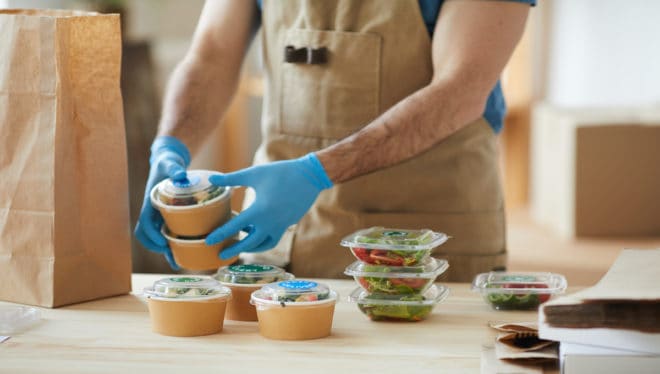How far away is death? Compliant gloves

“Bare-handed cross-contamination is a common contributory factor in foodborne outbreaks. But how much better are ‘food compliant’ gloves?”
With this introduction, Food Safety News recently delved into the topic of food compliant gloves — an area potentially affecting anyone consuming food from an outside source — in “Are food compliant gloves always up to the job?“
Steve Ardagh is the chief executive officer of Eagle Protect, which supplies gloves subject to “fingerprint” analysis. The food safety process and testing far exceed FDA glove compliance.
Ardagh, known as “The Glove Guy,” uses food safety trade shows and other public forums to spread the word about the faults of some “food compliant” gloves on the market.
Eagle Protect’s Fingerprint Glove Analysis involves several tests to ensure quality that exceeds FDA compliance. Included are:
- Gas Chromatography-Mass Spectrometry-The chemical signature of glove raw material “ingredients are tested to determine consistency in manufacturing and make sure no toxic chemicals are found that could impact food safety and the health of the glove user.
- Physical Chemistry-Specific glove type can risk pathogen cross-contamination in ready-to-eat foods. The surface tension of liquids or semi-liquids is tested for surface-free energy. It determines cross-contamination or transfers potential.
- Microbial Analysis–Provides specific profit for how gloves are manufactured to protect against intentional or accidental contamination.
- AQL, Strength & Elongation Puncture Resistance: Structural integrity tests to ensure gloves exceed medical-grade AGL requirements, preventing pinhole defects.
- In Vitro Cytotoxicity Analysis--Testing for chemical, pesticides, microbial contaminants, endotoxins, glycols, detergents, soaps, oils, and others.
Why aren’t all food safety gloves compliant? Eagle’s Ardagh says the production and manufacture of food contact gloves are largely unregulated, with limited and infrequent glove polymer migration testing.
Eagle consequently developed its battery of tests, which it calls the “Fingerprint Glove Analysis.”
Third parties conduct the tests, cutting the risk for Eagle.
FDA’s Current Good Manufacturing Program for food contact gloves requires that they be “in intact, clean, and sanitary conditions” Impermeable material is preferred.
To be “FDA compliant for food handling,” gloves should be lab-tested once for substances generally recognized as safe for food or food packaging. No repeat testing is required.
Ardagh says the minimal and infrequent testing means there are food-compliant gloves on the market that are not free from harmful toxic chemicals. Eagle Protect independent microbial contaminant analysis of 25 new and unused food gloves contained E. coli, listeria, mold, fungus, feces, and other pathogens.
Eagle is also promoting “Glove Traceability,” with each container and lot number providing “a unique and transparent look into the glove’s supply chain. Glove traceability protects against fraud and provides specific product specifications, quality and compliance certifications, and fingerprint tests results.
Ardagh says Eagle’s traceability system addresses FDA’s “New Era” of Smarter Food Safety.
Content/image source/credit: Food Safety News, “Are food compliant gloves always up to the job?” by Dan Flynn.
The TapRooT® System trains you to solve problems
Circumstances can crop up anywhere at any time if proper and safe sequence and procedures are not planned and followed. We encourage you to learn and use the TapRooT® System to solve problems.
TapRooT® has a team of investigators and instructors with years of extensive training ready to offer assistance worldwide. We also offer ongoing support to our clients through free newsletters and Root Cause Tip videos, the Root Cause Analysis blog, and our annual Global TapRooT® Summit.
Register for a TapRooT® RCA training course
Register for a TapRooT® RCA training course. We offer a basic 2-day course and an advanced 5-day course, and many more training topics/courses.
Contact us, or call 865.539.2139 about having a course at your site or for further root cause analysis training opportunities. We’re here to find solutions for you.



